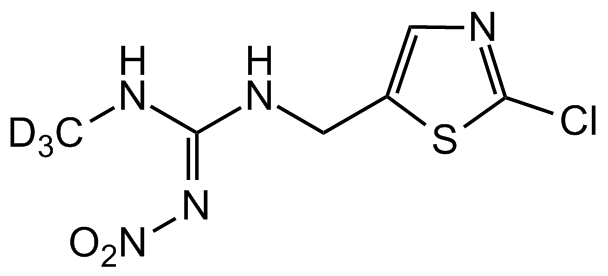Clothianidin-d3
| Code | Size | Price |
|---|
| CDX-C0190-M050 | 50 mg | £145.00 |
Quantity:
| CDX-C0190-M100 | 100 mg | £237.00 |
Quantity:
Prices exclude any Taxes / VAT
Overview
Regulatory Status: RUO
Shipping:
AMBIENT
Storage:
-20°C
Images
Documents
Further Information
Alternate Names/Synonyms:
(E)-1-(2-Chloro-5-thiazolylmethyl)-3-(methyl-d3)-2-nitroguanidine
Appearance:
White to light brown powder.
CAS:
1262776-24-8
Class:
9
EClass:
32160000
Form (Short):
liquid
GHS Symbol:
GHS07,GHS09
Handling Advice:
Protect from light and moisture.
InChi:
InChI=1S/C6H8ClN5O2S/c1-8-6(11-12(13)14)10-3-4-2-9-5(7)15-4/h2H,3H2,1H3,(H2,8,10,11)/i1D3
InChiKey:
PGOOBECODWQEAB-FIBGUPNXSA-N
Long Description:
Chemical. CAS: 1262776-24-8. Formula: C6D3H5ClN5O2S. MW: 252.7. Clothianidin-d3 is deuterium labelled Clothianidin, which is a neonicotinoid insecticide. Neonicotinoids (NNIs) are a family of active substances used in plant protection to control harmful insects and also in veterinary medicine. Neonicotinoids act selectively on the insect nicotinic acetylcholine receptors (nAChRs), initially stimulating postsynaptic receptors, increasing Na+ ingress and K+ egress and then paralyzing nerve conduction, resulting in rapid death. This compound can be used as a reference compound, in the determination of several neonicotinoid insecticides present in bee pollen, using ultra-high performance liquid chromatography (UHPLC) coupled with mass spectrometry (MS).
MDL:
MFCD17019117
Molecular Formula:
C6D3H5ClN5O2S
Molecular Weight:
252.7
Package Type:
Vial
PG:
III
Precautions:
P273 - P301 + P312 + P330
Product Description:
Clothianidin-d3 is deuterium labelled Clothianidin, which is a neonicotinoid insecticide. Neonicotinoids (NNIs) are a family of active substances used in plant protection to control harmful insects and also in veterinary medicine. Neonicotinoids act selectively on the insect nicotinic acetylcholine receptors (nAChRs), initially stimulating postsynaptic receptors, increasing Na+ ingress and K+ egress and then paralyzing nerve conduction, resulting in rapid death. This compound can be used as a reference compound, in the determination of several neonicotinoid insecticides present in bee pollen, using ultra-high performance liquid chromatography (UHPLC) coupled with mass spectrometry (MS).
Purity:
>97% (HPLC)
Signal word:
Warning
SMILES:
ClC1=NC=C(CN/C(NC([2H])([2H])[2H])=N/[N+]([O-])=O)S1
Solubility Chemicals:
Soluble in chloroform, acetone or acetonitrile.
Transportation:
Non-hazardous
UN Nummer:
3077
UNSPSC Category:
Biochemical Reagents
UNSPSC Number:
12352200
Use & Stability:
Stable for at least 2 years after receipt when stored at -20°C.
References
(1) M.Chen, et al.; J. Agric. Food Chem. 62, 6082 (2014) | (2) A. Schaafsma, et al.; PLOSone 10, e0118139 (2015) | (3) Y.-F. Huang, et al.; Appl. Sci. 10, 6775 (2020)



